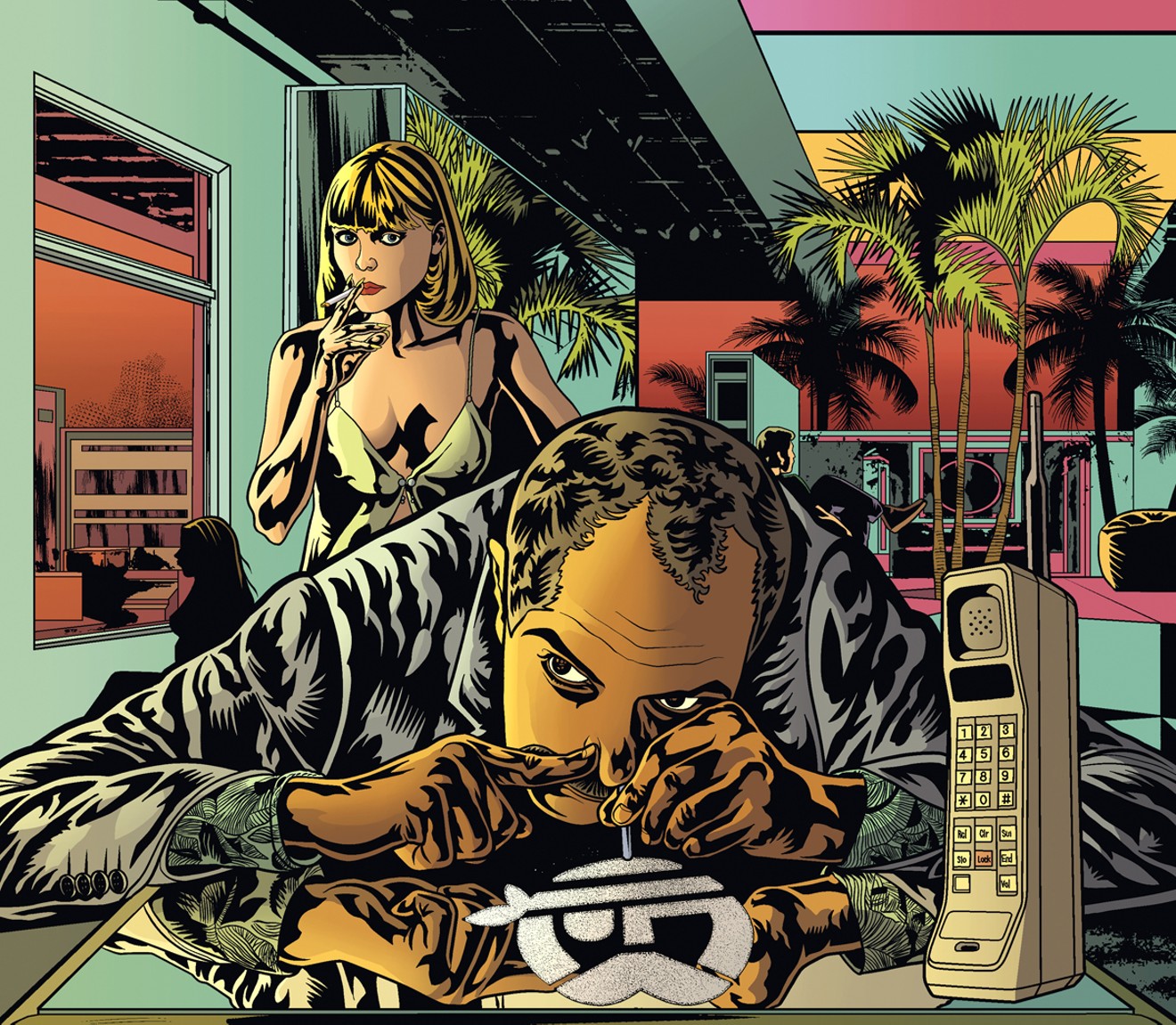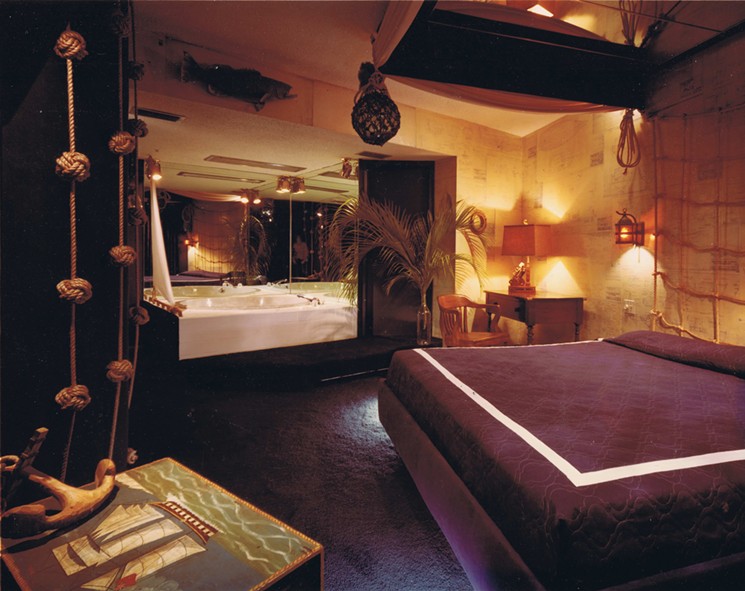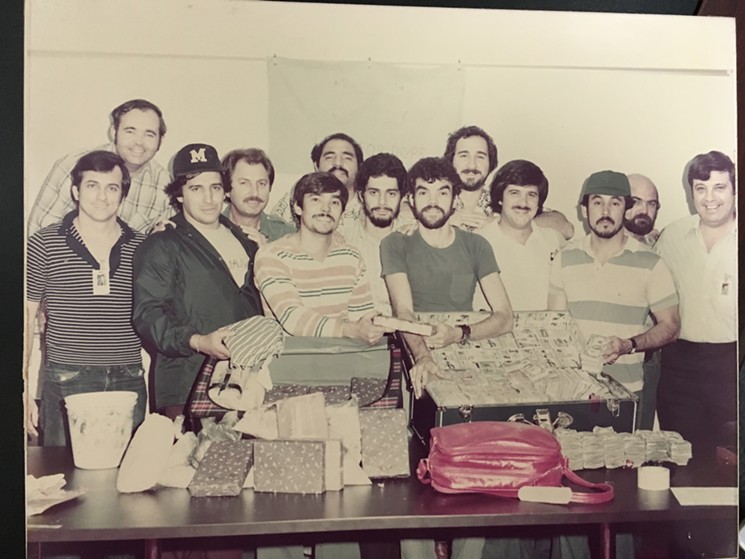Editor's note: In 1997, Miami New Times published a story by Sean Rowe, "Glorious and Notorious," that helped inspire the 2006 documentary Cocaine Cowboys. Rowe's piece described the Mutiny Hotel at 2951 S. Bayshore Dr. in Coconut Grove as a mecca for the 1980s' cocaine kingpins, adding this: "Fact always did blend with fiction there. In its time there was nothing like it, and today it lives on in hindsight like the afterimage of a hallucination, bright but blurry."
This week, Penguin Publishing Group issues the book Hotel Scarface: Where Cocaine Cowboys Plotted to Control Miami by NPR personality Roben Farzad. The following is an excerpt of the volume, which can be purchased via the Penguin website.
America in the late 1970s and early '80s was in a pronounced funk: Inflation and unemployment were high; consumer sentiment was in the dumps. But so exceptional was Miami's cocaine economy that dopers were paying banks to accept suitcases full of cash (while certificates of deposit were yielding 20 percent, on top of your choice of toaster or alarm clock). According to one study from Florida International University, at least one-third of the city's economic output was derived from narcotics at the time.
Burton Goldberg's Mutiny at Sailboat Bay was one of the country's most lucrative hotels, perennially overbooked and sending off armored trucks with sacks of its cash profits, albeit in the new murder-and-drug capital of America, a city that had been ravaged by race riots, gun killings, and the sudden arrival of 125,000 Cuban refugees, many of them sprung right from Fidel Castro's jails.
By the turn of the decade, the 130-room hotel and club was a criminal free-trade zone of sorts where gangsters could both revel in Miami's danger and escape from it.
"All roads led back to the Mutiny," said Wayne Black, an undercover cop who listened in to dope deals from a tinted van across the street, often wearing nothing but BVDs to cope with the stifling heat and humidity. "The druggies," he said, "the celebs, the crooked pols, spies, the informants, cops — good and bad — were all there."
So much hot money was sloshing around Miami that the Mutiny was selling more bottles of Dom Pérignon than any other establishment on the planet, according to the bubbly's distributor, whose executives visited in disbelief at the turn of the decade.
Cases of $150-a-bottle Dom Pérignon emptied into your hot tub? Right away!
tweet this
They heard right: A suite at the hotel was converted into a giant walk-in cooler; beautiful women would ooh and ahh at tabletop cascades of bubbly in stacks of flutes; dopers bought bottles for the house when their loads came in; and management often flew out the Mutiny's private plane at the last minute to procure even more from other cities.Internationally wanted hit men and mercenaries chilled at the Mutiny. Frequent visitors kept their guns tucked in the cushions, and cases of cash and cocaine in their suites. Bullets flew. Thugs were nabbed. Refugees snuck in. Cops were bribed. Dopers were recorded. Pilots were hired. Contracts were placed. Plots were hatched.
You might recognize this backdrop as the Babylon Club in the movie Scarface, whose creators, Oliver Stone and Brian De Palma, stayed at the Mutiny and sought permission to film there. In Stone's screenplay, he accidentally referenced the Mutiny Club; stars Al Pacino, Steven Bauer, and other supporting cast checked in at the hotel.
Miami Vice stars were also gravitationally pulled to the Mutiny. Don Johnson partied there, and Philip Michael Thomas moved in with his family and insisted on parking his purple imitation Ferrari out front on the curb. The hit show's creators studied agents and kingpins at the Mutiny; one cooperating drug lord even finagled his way onto two episodes.
The Miami of the Mutiny's heyday abounded with the surreal. So much marijuana was getting confiscated in the waters around South Florida that Florida Power & Light was opportunistically burning tons of it to run its generators: 732 pounds of pot could replace a barrel of crude. Take that, energy crisis!
Area McDonald's restaurants were running out of their tiny spoon-tipped coffee stirrers — they were perfect, it turned out, for portioning and sniffing cocaine. Mutiny dopers wore bronzed ones around their necks to advertise how far they'd come.
Burger King, meanwhile, loaned the overwhelmed county morgue a refrigerated truck. Bodies were turning up in gator-infested canals; in duffel bags alongside the Turnpike; bobbing out of drums, bins, and shopping carts in marinas along Biscayne Bay. Machine-gun fire rained over the parking lot of the city's busiest mall.
All of which would soon land Miami on the cover of Time magazine as "Paradise Lost."
The Mutiny stood out as a lush oasis within this apocalypse.
The Magic City was now the planet's cocaine entrepôt — its Federal Reserve branch was showing a $5 billion cash surplus — so this hotel and club became the place south of Studio 54 to blow illegal tender.
The club's $75 metal membership card, embossed with the Mutiny's winking pirate logo, got you in the door and certainly came in handy for cutting and snorting lines.
But it was cash — lots and lots of it — that got you everything else: Cases of $150-a-bottle Dom Pérignon emptied into your hot tub? Right away!
A private jet for jaunts to the islands, stocked with Mutiny girls, a five-man crew, and stone crab claws on dry ice? No sweat.
Your machine guns, bullets, and silencers discreetly locked in a chest? Sin problema. Plus, a hostess would hide your piece in her skirt if the cops showed up, while another Mutiny girl was adept at clicking her stilettos against guys on the dance floor to check for ankle holsters.
"We couldn't just walk into the Mutiny with a cheap rubber watch," said Wayne Black, the undercover cop who would borrow a Rolex from the police evidence locker before going there. "You'd be buying Dom with the bad guys. You owned a Pinto but drove home a Jag. 'Daddy,' your kid would say, 'the neighbors say you sell drugs.'"
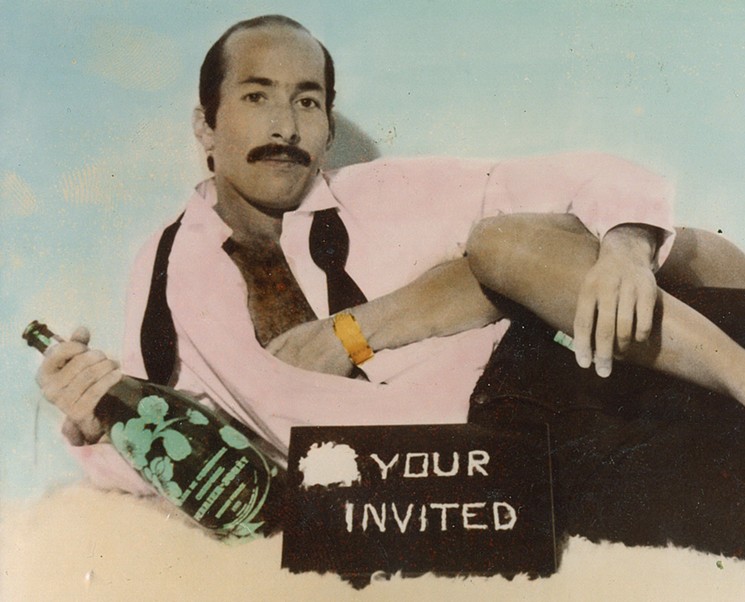
No one in this hedonistic fantasyland knew or cared that the 22-year-old small-time dealer Owen Band had an older brother working drug cases in the state prosecutor's office. Few in this lair of high-school dropouts that was the Mutiny knew he was the 1977 salutatorian at Boston University, where he gave a speech titled "The Value of an Education":
We have seen countless examples today of unfulfilled lives devoid of ethics and an understanding of basic moral principles. We are surrounded and led by men with encyclopedic knowledge, but without a capacity to tell right from wrong.
Band turned down Georgetown to attend BU on a scholarship.
He was a star wrestler and debater at North Miami Beach High and was bar-mitzvahed nearby at Beth Torah Synagogue. So how in the world could a nice Jewish salutatorian end up dealing and debauching at the Mutiny? This is the long and short of it: So big and sprawling was Muchachos Corp. (a big drug-dealing syndicate that hung out at the Mutiny Club), so voracious were the demands of its supply chain, that it was bound to suck in the peculiar resumé of someone like Owen Band.
Rewind to 1977. Band thought he'd be giving his BU commencement address with an acceptance letter to Harvard Law School in tow. So confident was he of getting in that it was the only program he applied to, having spent hours across the river in Cambridge buttonholing professors and deans about his application. He even had a recommendation from his internship for Florida Gov. Bob Graham, an antidrug crusader.
"He showed me a huge rock of coke... He said he didn't just want to 'give it away to all the girls with long pinkie nails.'"
tweet this
But when Band was wait-listed by Harvard, he suffered an attack of Crohn's disease and had a nervous breakdown. He ended up depressed and back at his parents' house in North Miami Beach.
Band's parents, always doting on his older brother, an assistant state prosecutor in Miami, pushed the graduate to get out of the house and look for work. He settled on a bartending gig at a downtown Miami discotheque, where exile gangsters would tip him in hundred-dollar bills and pinches of quality Peruvian cocaine.
About the first time he tried blow, Band recalled: "I took the guy's hundred-dollar bill, bent over, and inhaled deeply. Immediately, my head snapped back, and I felt a rush — like all my senses were heightened."
"Whoo! Fuck!" he screamed. First, the stuff smelled like bubblegum. But then he couldn't feel his nose, and his heart felt like it was going to bore a hole out of his chest. Band saw his bright-red face reflected in the table's glass layer. The soundtrack to Saturday Night Fever blasted in the background, and he could discern the smallest notes. The agony of getting hosed by Harvard Law and having a nervous breakdown dissolved into irrevelevance. "I could do anything," he said.
In 1979, when the disco was shut down in a cocaine sting operation, Band went to the Mutiny to catch up with former co-workers who had just been hired there. He saw Fernando Puig, the club's gargantuan head of security, handling a Colt .45. "It looked like a toy in his hand," he said. Band ordered a drink and took in the scene. The bartender pointed out Deep Throat star Linda Lovelace, a porn legend who shot most of her famous scenes a few blocks away. He traded glances with the "Cutler Coot," who was sitting by himself, dressed in jeans and a black Members Only jacket. The tall, lanky man's idea of a combover was tying up what was left of his longish hair in a bun. One of Band's former co-workers, now a Mutiny hostess, filled him in. The Coot, she explained, "was like a godfather" to the girls who worked at the Mutiny. He always had coke and always hugged and kissed on both cheeks. He was a historical figure — something about Kennedy and Castro — and was enough of a big deal at the club that he somehow never, ever paid for anything.
Had Owen Band researched a bit more about the Coot, he would have learned that the guy was one of the last Bay of Pigs prisoners sprung by Fidel Castro. He took a bayonet to the shoulder while attempting to fight his jailers.
After John F. Kennedy was killed in 1963, the exile showed up in New Orleans, claiming to want to help prosecutor Jim Garrison, the assassination's chief investigator, with his case. Some politicos had been fingering Castro agents; others implicated the CIA and Cuban exiles. The Coot, invoking his patriotic duty, insisted he was so well sourced in both worlds that he would be an invaluable asset for Garrison.
The prosecutor agreed to the exile's offer, only to cut ties with the Coot when he realized he was depleting his budget with dead leads and unreliable information — and probably reporting back to his handlers in the CIA. In 1978, the Coot was ordered to appear before the House Select Committee on Assassinations but was not questioned about the period leading up to Kennedy's death. The CIA instructed the committee on what it could and could not ask him.
At the Mutiny, Band walked over to the older man's table. They made small talk and Band told him about his unconventional route back down to Miami from New England's ivory tower. He dropped the names of exiles who used to party with him at his old job; the Coot said they had fought together at the Bay of Pigs.
"He showed me a huge rock of coke," recalled Band. "Like three or four ounces. And he said he didn't just want to 'give it away to all the girls with long pinkie nails.'"
The Coot invited Band upstairs. In the elevator, he admitted he hadn't paid a cent for his dinner. No, he had "bartered" his quality blow with Chef Manny in the kitchen, who was happy to grill him up anything he craved, from a huge steak to lobster tails to any fish he could think of. "There's a lot going on like that here," he explained.
They entered the Mutiny's expansive Emerald Isle Room, overlooking the bay. The Coot, it turned out, had also traded cocaine for the keys (the weeknight front desk guy had a nose for it). Band and the Coot took a toot together. It was powerful, mind-fucking stuff, the kind that made you feel immortal and indefatigable. Said Band: "I had never tried anything like it. I didn't even know it could be that good."
He made some calls — "Hey, Mandy, what you doing? You down to party? Yup. Yeah, bring her too. No, she doesn't have to be a member. I'll leave your name at the front" — and what ensued was an Emerald Isle all-nighter with five girls. The Coot, the lapsed honor student, and coke whores multitasked, snorting lines, drinking champagne, and boinking one another. On the bed. On the floor. On the balcony. In the hot tub, which they anointed with aromatic Vitabath.
At 5 a.m., the Coot abruptly got up and said he had to leave, warning his guests (those who weren't coked out of consciousness) not to use the room phone and to be out by 11 a.m. at the latest, when the maid would show up to clean the $500-a-night suite.
After he left, one of the girls who had been to this kind of rodeo before explained a thing or two about the mysterious Coot: He kept a low profile outside the Mutiny and didn't want anyone to know where he lived. Endowed with an enormous cock and uncommon stamina — even when coked out — he had an insatiable appetite for younger women; one remembered him slapping his manhood against the side of their room's TV.
The Coot always kept a gun in his boot. He once pointed it at the head of some guy who dared beat him at arm wrestling. And the old spook often repaired upstairs to an always-booked suite whose balcony was equipped with a shortwave radio. He was receiving messages from Biscayne Bay and beyond — from dealers, spooks, gunrunners. Why? Who knew? Point was, the girls told Band, people at the Mutiny knew not to ask.
As for the legend that he was somehow involved in the Kennedy assassination, the Coot would only smile when a clubgoer dared ask if it was true that he had photos from Dallas's Dealey Plaza.
"I felt like a little Meyer Lansky."
tweet this
After the all-nighter, Owen Band drove home. His head spinning, heart pounding, and mouth dry from all the cocaine and alcohol, he proceeded to sleep until 10 at night.
Then he sped back to the Mutiny. Only, through the back this time, and straight to the Coot's table. The old man greeted him with a big Cuban hug and a rascally grin — as in: Shall we do it again?
It was the middle of the week. "Fuck me," said Band, "if I was ever going to go back to law school."
The Coot took him around the club. He introduced the well-spoken Jewish kid — "this is my smart nephew" — to Carlene Quesada, a coke lord who held court at a corner table. When Quesada got up to hug the Coot, the anti-Castro hero, he extended his hand to Band, who refused to shake. He thought of Quesada as a rat, remembering him in the pages of the Miami Herald. Nevertheless, Band took a seat at the doper's table and hit on his groupies.
Later in the men's room, "Super Papi," Quesada's bodyguard, walked up behind Band at a urinal. "You know," he said, "you'd be dead right now in a ditch covered with lime if you weren't with the Coot."
Band apologized and swore he didn't intend disrespect. He could explain. He followed Super Papi out to the valet and persuaded him to let him ride shotgun in his black Benz, which sported a steering wheel covered in $50,000 worth of diamonds.
Flying through stoplights on Biscayne Boulevard at 80 mph while reaching into his glove compartment for cocaine, Super Papi remarked, "Hey, if you're going to be a criminal, be a criminal 100 percent of the time. You know?"
One night, while Band was having a drink at the Coot's table, none other than speedboating kingpin Willie Falcon sent over a bottle of Dom and gestured for him to come over. They shared some wine. No words exchanged. Just nods and heads bouncing to the DJ's latest spin. It was a body-language check. Band glanced back at the Coot, who nodded back approvingly — as in, just roll with it.
Falcon's deputy, Venao (the Deer), later materialized. He invited Band to a hallway connecting the Upper Deck to the hotel, where the Muchachos kept several suites.
"You cool?" he asked Band. "You cool, meng, to..." The dashing Cuban pinched the tip of his nose twice, pointing upstairs. They rode the elevator up to an especially large suite that practically covered a whole floor of the hotel.
Venao shut the door and opened the curtains to a gorgeous view of the bay. There were maybe 150 sailboats speckling the water. Venao cracked open a kilo of shiny blow. It was scaly and translucently pink — hallmarks of high quality, someone had told Band.
Venao gestured thumbs-up and pinched some into an indentation he was able to make in the fleshy area that connected his thumb and forefinger — the anatomical snuff pouch, it was called at the Mutiny. "Try it," he said. "It's good, jes?"
Band realized he was being recruited. It would be shrewd diversification on Willie and Venao's part: Enlist an educated, well-spoken white kid to move the stuff among spoiled pals up North. Surely, the Coot had filled in the Muchachos. "There was just so much cocaine coming in," reasoned Band, "that you couldn't find distributors fast enough."
But Band also knew he was a guppy. He could probably traffic in grams, not kilos. He crunched the risk-reward scenarios in his head as Venao tooted more of the pink stuff and licked powder up into his gums. If Band took on more than he could deal, he'd lose any goodwill or rep he had built up at the Mutiny, however inadvertently. If he took on grams, he'd be laughed at.
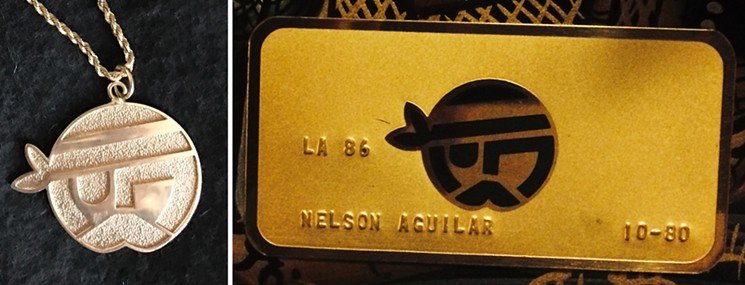
Or, he said, "It would be, 'I told you: The Coot's cheap Jewish nephew, Owen Band, wanted free blow.' No. No."
After another toot, Band mustered the courage to ask Venao for a special arrangement. The Deer shrugged an OK. "At the beginning," recalled Band, "they'd throw me a kilo and say, 'Go help yourself.' You'd put away seven or eight ounces at the table, using a ladle and baggies."
He learned that even when he cut Venao's blow with powdered baby laxative, his stuff sold like mad up North. Band had a pal in Atlantic City who would gratefully pay $2,200 an ounce.
Then there were old acquaintances from Boston University, spread all across the most moneyed parts of Long Island, who would pay top dollar for "good shit" to powder up with before hopping the evening train into Manhattan.
One was the son of Pittsburgh steel money who partied hard at New York's Studio 54. He introduced Band to co-owner Steve Rubell and his head of security at the mobbed disco. "I had carte blanche there," Band said. "I'd be partying with all the celebrities. Liza Minnelli. Morgan Fairchild. The 'disco dust' that all these 54 people were so used to was so fucking stepped on — so cut, abused, and watered down. It might have been 20 percent pure."
Band's stuff, by comparison, was 50 percent pure. And, validating the gambit made by Venao, he was white, well-spoken, and nonthreatening, compared with the stereotypical Cuban or Colombian cocaine cowboy. Band was summoned to Steve Rubell's mansion at least three times to deliver his product. He was flying up from Miami four or five times a month now.
"The airports," he said, "were a joke back then." Band knew a coke-crazed stewardess named Candy and a dozen other employees at Miami-based Eastern Air Lines who were happy to mule suitcases for him and run interference with gate agents and security guards.
The 7 a.m. from Miami to New York was his favorite flight: "The screeners," he explained, "were not awake." Walk straight through at a brisk pace. Always buy round-trips, even if you were only going to use one leg.
Band would walk into Miami International with three ounces of his cocaine in each boot. The rest was packed into seven hidden compartments in his jacket. "I never flew wearing the Rolex," he added. "I dressed down. I was Anglo. Just don't look nervous."
Back at the Mutiny, Band was now being extended several lines of supply, like so many credit card applications in the mail. "I could now go to eight different guys at three different tables to take product of any quality," he said.
"How many k's?" they'd ask.
"You mean, kilos? Kilos?! I'm talking ounces. I need, like, 50 ounces, man," he'd say.
"I'd be told to go up to a suite in the hotel to a walk-in closet.
'Here's the key. Help yourself, man.' Like it was a favor."
Band noticed his suppliers weren't even counting his cash anymore. "Why disrespect a guy doing good business with you?" he reasoned. "And then you'd see each other at the Mutiny and just smile at one another. You felt connected," he said. "I felt like a little Meyer Lansky."
As he started raking it in, Band felt emboldened enough to approach banker Ray Corona — the Mutiny's de facto chief financial officer — at Table 3 for some lockable Kevlar Sunshine State Bank money bags, mandatory fashion accessories for any serious Miami cocaine dealer.
On Passover, he pulled up to his parents' house in his new Mercedes two-seater, wearing a $20,000 diamond-studded Rolex and a gold coke spoon around his neck. His older brother, the state prosecutor pursuing dopers, barely made eye contact. Owen Band played up the tension by asking to read the parts of the Jewish seder that involved participation by the "wicked son."
His parents acted like they could hardly recognize their sniffling salutatorian; decked out in loud bling, he clearly was not studying for the LSAT.
In Band's childhood bedroom was the Perry Mason legal briefcase his father had bought him before his senior year of college, back when his manifest destiny was an acceptance letter from Harvard Law. "Work hard enough and you can go anywhere you want," read the card inside.
Bullshit, he thought, suppressing the urge to cry.
"To be able to get away with this," he said, "fucking the system that fucked me. Well, it was great comeuppance."
Adapted from Hotel Scarface: Where Cocaine Cowboys Partied and Plotted to Control Miami by Roben Farzad, published by Berkley, an imprint of Penguin Publishing Group, a division of Penguin Random House, LLC. Copyright © 2017 by Roben Farzad.

